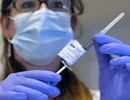First trial of Ebola drug begins in West Africa
Doctors Without Borders (MSF) plans to begin unprecedented human trials in West Africa to test a drug to treat Ebola. The first trials will begin in December and results could be available by February next year.
 |
Patient goal is to live 2 weeks
MSF said yesterday it would begin trials of drugs and blood from survivors as a treatment. The trials in Guinea are aimed at quickly finding a life-saving treatment to combat the disease that has killed more than 5,100 people since December last year.
The French National Institute for Health and Medical Research (INSERM) will test the antiviral drug favipiravir in Gueckedou, southern Guinea. Meanwhile, the Institute of Tropical Medicine (ITM) will lead trials of “whole blood and plasma therapy” at MSF’s Donka Ebola Centre in Conakry, the Guinean capital. MSF is discussing a third trial of brincidofovir, in the Liberian capital Monrovia, but has not yet been given the green light.
'Miracle drug'
Many drugs that work against other viruses are ineffective against Ebola. "Either the drug is very effective and becomes a miracle drug... or it doesn't work at all, and that's very likely to happen," said Dr. Antierens, MSF's director.
The goal of a successful drug trial would be for the patient to survive for 2 weeks, and no patient would be given the drug without written informed consent.
According to MSF, normal patient care procedures are only slightly disrupted. Patients in the Conakry trial will receive transfusions of blood or plasma containing antibodies taken from people who have survived the disease.
The project's main coordinator, Johan van Griensven, urged recovered patients to donate blood, saying the help would reduce the stigma they face in their communities.
The antiviral drugs were selected from a short list drawn up by the World Health Organization, after considering a range of issues, including testing in non-human mammals and the drug's availability.
“New experience”
“Conducting clinical trials of investigational drugs in the midst of a humanitarian crisis like this will be a new experience for all of us, but we are determined not to let the people of West Africa down,” said Peter Horby, who is expected to lead the upcoming Monrovia trial. These will be the first trials to be conducted on Ebola patients.
“Every time a patient gets to day 14, we recalculate the numbers and see what the survival/death ratio is… If the mortality rate is 50% or worse, we say there is no evidence that the drug works and we stop the trial,” he said. “If the survival rate is 80% or higher, we say there is good evidence that the trial works.”
Although nearly all of the deaths in the outbreak have been in Liberia, Sierra Leone and Guinea, small clusters have emerged in Nigeria, Senegal, the United States and Spain. Mali is struggling to contain the outbreak after the death of a Muslim pastor in October, and just this week a male nurse who treated him died of the disease in the capital Bamako.
The WHO announced on Wednesday that the outbreak had passed its most critical point, with 5,160 deaths out of about 14,000 cases since the start of the outbreak.
Ebola, which is spread through bodily fluids, causes hemorrhagic fever and is fatal, with a fatality rate of 70% in this outbreak. There is no specific treatment and no vaccine – although one of the leading candidates, ChAd3, made by GlaxoSmithKline, is being tested in Mali and elsewhere.
The patient's best chance of survival, if the disease is detected early enough, is to take paracetamol to reduce fever, rehydrate and have good nutrition.
Ebola, which first appeared in the Democratic Republic of Congo in 1976, is one of the most deadly pathogens known to man, and victims typically die within days of showing symptoms.
According to Dan Tri






